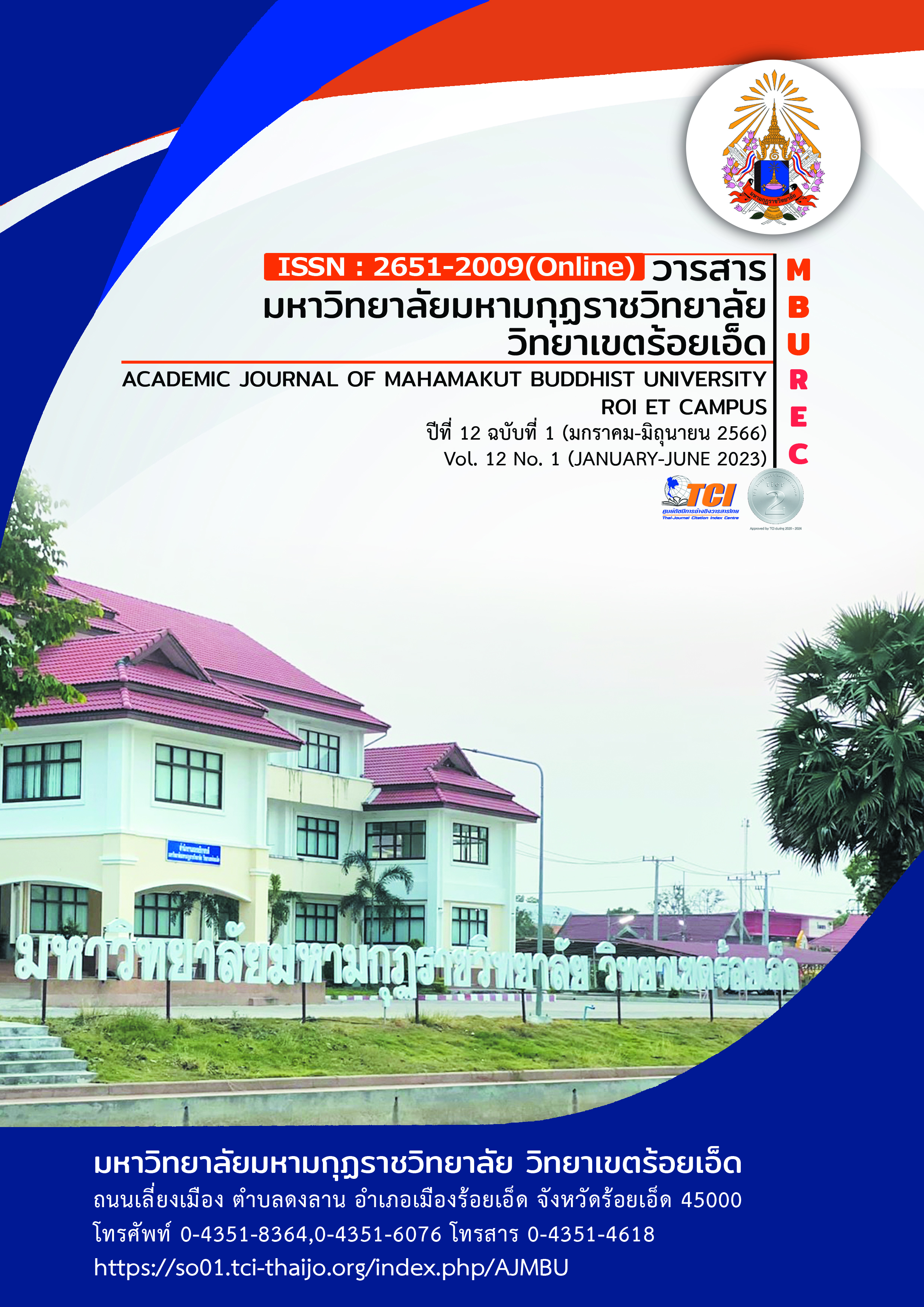TRANSFORMATION LEADERSHIP IN THE NEW NORMAL AGE OF SCHOOL ADMINISTRATORS UNDER THE SECONDARY EDUCATIONAL SERVICE AREA OFFICE SURIN
Main Article Content
Abstract
The purposes of this research article were1) to study on the transformational leadership in the New normal age of school administrators under the Surin Secondary the Educational service area office 2) to compare the transformational leadership in the New normal age of school administrators under the Surin Secondary the Educational service area office and3) to study the recommendations of transformational leadership in the New normal age of school administrators. The sample group in this research were 341of administrators and teachers under the Surin Secondary the Educational service area office. The research instrument was questionnaire. The statistic used in data analysis were percentage, mean, standard deviation, t-test and analysis of variance (F-test).
The research’s results found that :1. The transformational leadership in the New normal age of school administrators under the Surin Secondary the Educational service area office. Overall, the disposal was at the highest level.2.Comparative results of the transformational leadership in the New normal age of school administrators under the Surin Secondary the Educational service area, classified by educational level. There were no different opinions on the level of practice between the administrators and the instructors with bachelor's degree with administrators and the instructors with postgraduate education, classified by position the administrators and the instructors were different opinions on the level of practice, classified by work experience there were no different opinions on the level of practice whether they were the administrators and the instructors with less than 10 years of work experience, 10 – 20 years of work experience, or more than 20 years of work experience.3. From the recommendations transformational leadership in the New normal age of school administrator sunder the Surin Secondary the Educational service area office found that 1) On having an ideological influence aspect: the administrators should show a clear ideology, should be a good role model for subordinates and had a clear vision in the field of school administration2) Inspiring: the administrators should constantly inspire and motivate teachers.3) Intellectual stimulation: the administrators should encourage teachers to train new knowledge, motivate and encourage instructors to build Professional Learning Communities (PLC) andconstantlydevelopinstructors4) consideration of individual: administrators should understand each co-worker, understood individuality differences and promote and assign tasks according to the aptitude of the person, and5) digital skills: administrators should support and provide teaching aids, promote training of teachers in media, technology, communication and constantly studying new knowledge especially media, technology and innovation.
Article Details

This work is licensed under a Creative Commons Attribution-NonCommercial-NoDerivatives 4.0 International License.
References
จิณณวัตร ปะโคทัง. (2561). ภาวะผู้นำยุคดิจิทัลสำหรับผู้บริหารมืออาชีพ. อุบลราชธานี : ศิริธรรมออฟเซ็ท.
ธีรภัทร์ ถิ่นแสนดี. (2561). คุณลักษณะของผู้บริหารในศตวรรษที่ 21. รายงานการประชุมวิชาการและเสนอผลวิจัยระดับชาติ ครั้งที่ 1 “ระเบียบ สามัคคี บำเพ็ญประโยชน์เพื่อพัฒนาสังคมให้ยั่งยืน”. มหาวิทยาลัยมหามกุฏราชวิทยาลัย วิทยาเขตร้อยเอ็ด. 25 สิงหาคม 2561. 1287-1294.
ปิยวัณย์ ชินอ่อน. (2557). ศึกษาภาวะผู้นำการเปลี่ยนแปลงของผู้บริหารสถานศึกษาขั้นพื้นฐานสังกัดสำนักงานเขตพื้นที่การศึกษาประถมศึกษาร้อยเอ็ด เขต 1. สารนิพนธ์ศึกษาศาสตรมหาบัณฑิต สาขาวิชาการบริหารการศึกษา. บัณฑิตวิทยาลัย : มหาวิทยาลัยมหามกุฏราชวิทยาลัย.
พัชราภรณ์ ดวงชื่น.(2563).การบริหารจัดการศึกษารับความปกติใหม่หลังวิกฤตโควิด -19. วารสารศิลปการจัดการ. 4(3). 783-795.
รัตติกรณ์ จงวิศาล. (2556). ภาวะผู้นำ : ทฤษฎี การวิจัยและแนวทางสู่การปฏิบัติ. กรุงเทพมหานคร : สำนักพิมพ์แห่งจุฬาลงกรณ์มหาวิทยาลัย.
ศิริชัย แปลกสินธุ์. (2558). ภาวะผู้นำการเปลี่ยนแปลงของผู้บริหารสถานศึกษาในสถานศึกษากลุ่มเครือข่ายพัฒนาคุณภาพการศึกษาสามขาท่าหาดยาว สังกัดสำนักงานเขตพื้นที่การศึกษาประถมศึกษาร้อยเอ็ด เขต 2. สารนิพนธ์ศึกษาศาสตรมหาบัณฑิต สาขาวิชา การบริหารการศึกษา. บัณฑิตวิทยาลัย : มหาวิทยาลัยมหามกุฏราชวิทยาลัย.
สุขุม ทินนรัตน์. (2560). ภาวะผู้นำเชิงสร้างสรรค์ของผู้บริหารสถานศึกษา สังกัดสำนักงานเขตพื้นที่การศึกษามัธยมศึกษา เขต 25. สารนิพนธ์ศึกษาศาสตรมหาบัณฑิต สาขาวิชาการบริหารการศึกษา. บัณฑิตวิทยาลัย : มหาวิทยาลัยมหามกุฏราชวิทยาลัย.
สุภาภรณ์ พรหมบุตร. (2563). New Normal กับวิถีชีวิตทีเปลี่ยนแปลง. สืบค้นเมื่อ 19 กันยายน 2563. จาก https://www.dip.go.th/th/dowload-file-news?file=1622
สำนักงานเขตพื้นที่การศึกษามัธยมศึกษาเขต 33.(2563ก). แผนพัฒนาการศึกษา พ.ศ. 2563-2565.เอกสารสารสำดับที่ 1/2563. สุรินทร์ : กลุ่มนโยบายและแผน สำนักงานเขตพื้นที่การศึกษามัธยมศึกษา เขต 33.
สำนักงานคณะกรรมการพัฒนาเศรษฐกิจและสังคมแห่งชาติสำนักนายกรัฐมนตรี. (2559). แผนพัฒนาเศรษฐกิจและสังคมแห่งชาติ ฉบับที่สิบสอง พ.ศ. 2560 –2564. สืบค้นเมื่อ 19 กันยายน 2563. จาก https://www.nesdc.go.th/ewt_dl_link.php?nid=6422
สำนักงานเลขาธิการสภาการศึกษา. (2557). รายงานการวิจัยแนวทางการพัฒนาการศึกษาไทยกับการเตรียมความพร้อมสู่ศตวรรษที่ 21. กรุงเทพมหานคร : พริกหวานกราฟฟิคการศึกษา.
Christopher, D.C. Francisco. (2019). School Principals’ Transformational Leadership Styles and Their Effects on Teachers’ Sale-Efficacy. International Journal of Advanced Research. 7(1). 622-635.
Farhat, Munir. and Muhammad, Aboidullah. (2018). Gender Difference in Transformational Leadership Behaviors of School Principals and Teachers’ Academic Effectiveness. Bulletin of Education and research. 40(1). 123-128.
Hoy, W.K. and Miskel, C.G. (2012). Educational Administrator Theory Research and Practice. 7thed. New York : McGraw-Hill.
Nuqui, Avvin, V. (2020). Emergence of a Situational Leadership during COVIC-19 Pandemic Called New Normal Leadership. International journal of Academic Multidisciplinary Research (IJAMR). 4(10). 15-19.


